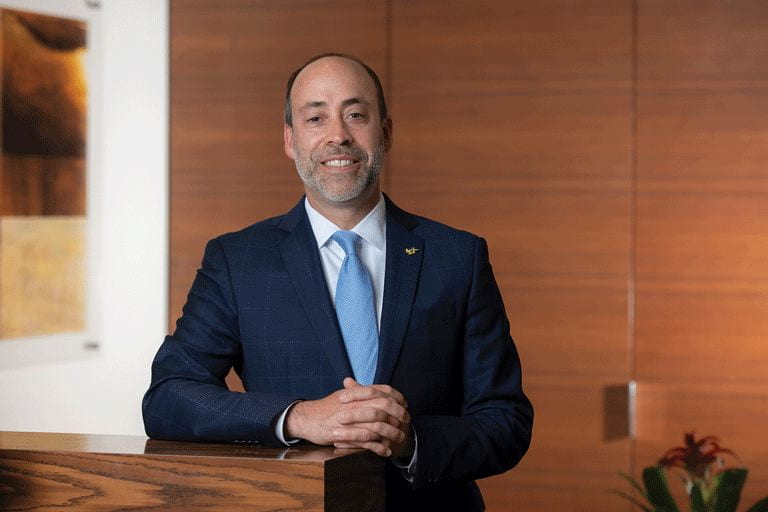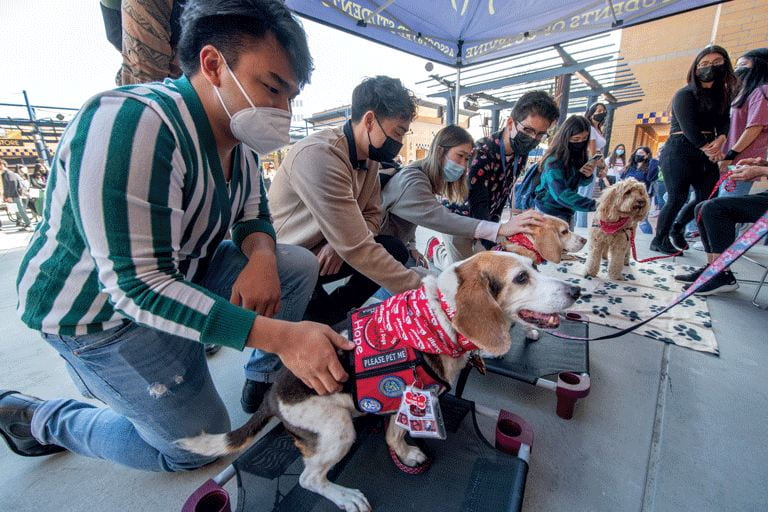Caring for Anteaters
Amid pandemic challenges, UCI’s mental health and wellness guardians work responsively – and passionately – to serve the campus community
Two cheerful beagles and a curly brown labradoodle were holding court on UCI’s Student Center terrace. More than 300 people stood in a line nearby, patiently waiting for their turn to cuddle the pups. The dogs – “Thera Puppies” – were advertised in a campus tweet: “Come and destress with therapy dogs! Snacks and stress balls will be provided courtesy of the Student Support and Advocacy Commission.” Three other organizations were involved too: the Center for Student Wellness & Health Promotion, the Counseling Center, and UCI Campus Assault Resources & Education.
It turned into a banner day in December just before finals with a bright blue sky and warm temperatures. The stress balls and snacks were popular, although they ran out, despite the 350 goodie bags provided. And the pups made everyone happy, but they accommodated so many eager students that they needed puppy rest breaks themselves.
“I felt like the students really needed an event like this,” says senior Norah Tabsh, the student support and advocacy commissioner. The pandemic, she adds, has been stressful and traumatic.
On college campuses across the nation, students are grappling with a mental health crisis created by the COVID-19 pandemic. They’ve endured shuttered campuses, online learning, the illness or death of loved ones, and – in the case of hospital employees as well as students – increased demand to work long hours coupled with the constant threat of exposure to disease.

In December 2021, U.S. Surgeon General Dr. Vivek Murthy issued an emergency advisory.
“Even before the pandemic, an alarming number of young people struggled with feelings of helplessness, depression, and thoughts of suicide – and rates have increased over the past decade,” Murthy wrote. “The COVID-19 pandemic further altered their experiences at home, school and in the community, and the effect on their mental health has been devastating. The future wellbeing of our country depends on how we support and invest in the next generation.”
UCI’s Marcelle Hayashida spends much of her time immersed in promoting mental health and wellness on campus. Associate vice chancellor for wellness, health & counseling services, she oversees eight offices, including the Student Health Center, the Counseling Center, UCI CARE and the Disability Services Center.
“What we learned during the pandemic is that there are a lot of other things that go into mental health beyond depression, anxiety and seeing a psychologist,” Hayashida says. “What are you feeding yourself? How are you sleeping? What do your social connections look like? Do you feel included? What support are we offering for students of color, for low-income students, for undocumented students?”
She adds: “We’ve learned a lot about all of these different threads that we need to weave together to support student mental health.”
Being nimble and receptive to change has been key. “We’ve worked hard to provide first-in-class, flexible, responsive support services to our students despite the challenges the pandemic has posed,” Hayashida says. “Our team members care passionately and understand the larger mission we’re working toward.”
And remote services have been a game-changer and are greatly utilized, she says: “With virtual therapy, students can interact with a therapist regardless of where they are in California.”
That doesn’t mean it’s been easy. Before the pandemic struck, virtual resources were very limited, explains Frances Diaz, director of UCI’s Counseling Center. She notes that if she had been asked about providing virtual services in November 2019, it would have been unimaginable. But then COVID-19 hit and the Counseling Center, she says, “transitioned from in-person to virtual services within two days.”
Nationwide Challenges

Universities across the country were all at once grappling with the same issues. A 2020 national survey of college students found that nearly 40 percent experienced depression. One in 3 reported having had anxiety, and 1 in 7 said they’d thought about suicide in the past year. In a 2020 survey of directors of college counseling centers, almost 90 percent reported that demand for their services had gone up in the previous year.
“The struggles are real and intensified,” says Dr. Vivien Chan, chief of psychiatry and mental health services at UCI’s Student Health Center. But, she adds, “there are many levels of student support and care delivery available, ranging from crises to longitudinal mental health treatment.” One newer tool, she notes, is therapy assisted online self-help, sponsored by the UCI Counseling Center and the University of California Office of the President. “This 24/7 on-demand resource is free to registered students and offers tools, education and support for common emotional and behavioral concerns.”
Through that long year and a half – from shutdown to the return to campus life in fall 2021 (before the advent of the omicron variant of COVID-19) – the UCI counseling system worked to make changes. When students returned, they came back to a full range of services that also included accessibility improvements such as the provision of private spaces they could use for virtual sessions with providers.
The pandemic did put an extra strain on students’ coping skills, says Doug Everhart, director of the Center for Student Wellness & Health Promotion. “People are stressed,” he says, “but all in all, most are doing well, despite all of the challenges: isolation, remote internet, environmental issues, finances and technical support problems.”
“What we learned during the pandemic is that there are a lot of other things that go into mental health beyond depression, anxiety and seeing a psychologist.”
In general, Everhart says, society does not do a good job ingraining coping strategies. That’s why UCI mentors students in this way, he notes: “If we can help people improve their physical health, eat well, get outdoors and learn mindfulness techniques, we can help them improve their coping skills.”
Two successful programs have been the Step Up! UCI bystander intervention training and Behind Happy Faces, which encourages and empowers students to share and support each other. The goal for both: learning that good mental health helps you more fully enjoy life and cope with its challenges, while poor mental health, on the other hand, may result in feeling unhappy, thinking unclearly or being overwhelmed by stressful situations.
Says Diaz: “Students deserve a huge shoutout for resilience during these times.”
Supporting Medical Personnel
Of course, students aren’t the only ones greatly affected by the pandemic. Even before COVID-19, more adults were experiencing mental illness, particularly anxiety and depression. According to the nonprofit Mental Health America, in 2019, just prior to the pandemic, almost 20 percent of Americans – nearly 50 million – reported having a mental illness. Over half of adults with mental illness do not receive treatment, the organization notes.
As coordinator of faculty and staff support services, psychologist Negar Shekarabi works with UCI employees suffering serious stress or other mental issues. In some cases, she says, they’re just burned out.
Support is offered for a wide range of issues, Shekarabi says. Among them are work-related stress, relationship issues, family problems, depression, anxiety and other emotional problems, grief and loss, and alcohol/drug and other addictions. Referrals are made to mental health services within faculty and staff health plans, as well as to community resources.
While much of the country went into crisis mode in 2020, America’s frontline workers have been among the hardest hit. UCI’s frontline workers have been under incredible pressure, with many fighting cases of post-traumatic stress disorder, burnout and other crisis-related employee concerns.

Chad Lefteris, CEO of UCI Health, discussed the issue during an Orange County Business Journal interview with local healthcare leaders that was published in April 2021. He was asked: “How do we help our people heal mentally, physically, and financially?”
Lefteris responded: “UCI Health recognized even before the pandemic hit the US that supporting its frontline caregivers and co-workers would be a key to managing this unprecedented public health crisis. We created a food pantry and free childcare program to assist employees who were spending long hours at the hospital.”
Also jumping into action, he added, was the Susan Samueli Integrative Health Institute, which began providing regular programs designed to reduce mental and physical stress in individuals and care teams.
And, Lefteris said, “as the demand for inpatient space grew at the height of the pandemic, so too did our commitment to creating places of rest for providers.”
“Our longstanding relationship with the Schwartz Center for Compassionate Healthcare, in which healthcare workers address the stress of their jobs, has focused on helping providers cope with their COVID-related experiences,” he continued. “In addition, the UCI human resources teams have [great] offerings to support mental and physical health and wellness, as well as financial support opportunities.”
The bottom line, according to Hayashida, “is that we have to be there for the staff. In order to be there for the students, we also need to be here for the staff.”
Meanwhile, students are taking as much in stride as they can. Sometimes that means cuddling a warm puppy. During finals week, the Center for Student Wellness & Health Promotion had its own event, called a “De-Stress Fest.” This time, more than 550 students showed up to pet a pup and consume healthy snacks and beverages.



